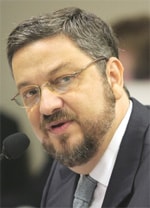Brazil

|
|
|
President Luis Inacio Lula da Silvas approval rating has dropped by six points since February of this year. Conducted by the Sensus polling firm and released by the National Transport Confederation late last month, the national poll found that personal approval for Lula has declined from 66.1% to 60.1%.
Lula, who is up for re-election in 2006, faces the dilemma of either alienating poor voters as he pares back government social spending or jeopardizing his hard-won reputation with investors for fiscal austerity if he boosts expenditures. Hundreds of landless peasants stormed Brazils finance ministry in Brasilia last month to demand more land reform funds. After 28 months in office, Lula has fallen behind job, land-reform and poverty goals after his government hiked the budget surplus and used high interest rates to cut inflation.
Meanwhile, Brazils government said it will not renew the standby credit agreement with the International Monetary Fund that expired at the end of March. Brazilian finance minister Antonio Palocci said the countrys economic fundamentals had improved since September 2003, when the agreement was sealed, and Brazil no longer needed the funds support.
Varig, the countrys flagship airline, has also improved its fiscal position in the past year. Brazils second-largest airline slashed its net loss to $33.5 million, or 87 million reais, in 2004, down from a loss of $700 million, or 1.8 billion reais, in 2003. And in the fourth quarter of 2004, the airline shifted into a net profit of nearly $85 million, according to Varig officials.
The economic improvements may not be enough for foreign investors, who poured about $869 million in direct investment into Brazil in Februaryabout 15% less than during the same month of 2004, according to the Central Bank Economic Studies Department. For the first two months of the year, foreign investment in Brazil totaled $2.08 billion, and in the 12 months ended in February of this year foreign investment tallied $18.2 billion.
In an effort to rein in inflation, this South American nations central bank unexpectedly raised its benchmark lending rate for an eighth straight month. The nine-member board headed by central bank president Henrique Meirelles voted on April 20 to push the overnight interbank rate a quarter percentage point up, to 19.5%. Economists had expected bank officials would stop the string of interest rate increases so as not to hinder the countrys economic expansion of the past two years. But policymakers are concerned about inflation, which is running at 7.5% for the 12 months ended in Marchtwo percentage points higher than their year-end target of 5.1%.
Paula L. Green



